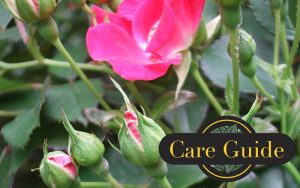
Knock Out Rose Care
Click Here for the guide as a PDF.
While Knock Out roses are very low maintenance, we have found that in our hot and humid northeast Florida climate, a few simple measures will help keep your roses looking like the knockouts they are.
Planting
Plant your roses where they will receive 4 to 6 hours of full sun daily so they will flower in spring, summer and fall, and protect them from salt spray. Amending the soil with Jolly Gardener organic compost or a good planting mix is recommended. Much of Florida’s coastal soils have an alkaline pH which roses like. However, you may still want to have your soil tested to determine pH and adjust as necessary. This can be done by the UF/IFAS Extension Soil Testing Laboratory.
Pruning
Knock Out Roses can simply be sheared to the desired shape and size, while also removing any dead wood. We suggest 3 hard prunes per year.
Pruning 1– In mid February we advise taking the plants down to 12-18”. This will remove any diseased foliage and help keep the plants full and bushy. It will also keep the plants from getting too large throughout the year, as Knock Outs can reach five feet if kept unchecked.
Pruning 2– In early summer we like to prune our roses back by half. This also keeps the roses from getting too large and helps keep a manicured look.
Pruning 3– In Late Summer/ Early Fall we also prune them which helps to remove some of the older looking foliage after a hot summer and encourages a new flush of foliage and flowers for the fall.
Deadheading
Knock Out roses are self-cleaning and will continue to flower and look fine without deadheading. We do suggest deadheading when convenient, however, since removing spent flowers will promote quicker flower cycles and also helps keep a tidy appearance between prunings.
Fertilization
We recommend fertilizing with a slow release fertilizer such as Dr. Earth’s Life Organic Fertilizer or Osmocote, every three months during the growing season. A good time to fertilize would be on or around your three pruning times. We also recommend using a liquid fertilizer such as Dr. Earth’s Total Advantage Rose and Flower fertilizer. Liquid fertilizer should be used on a monthly basis as Knock Outs use a lot of energy to grow all those beautiful flowers, and require a little extra fertilization to keep up.
Pest and Disease Control
Knock Outs don’t require the same high level of insecticide and fungicide treatment as you may have heard for many roses, but they do sometimes require a little attention. We can suggest appropriate treatments but most disease and insect problems can be controlled with prevention and cultural measures.
Cultural solutions:
- Avoid overhead watering, if possible, to help prevent the spread of fungal disease. If this is not possible, run your irrigation in the early morning as opposed to the evening. This limits the amount of time foliage remains wet.
- Rake leaf litter beneath the plant after the first pruning to remove dead and diseased leaves that have fallen during the winter. Replace mulch immediately to create a physical barrier between the plant and fungal spores on the ground. Do not mulch heavily though, and keep it at least 6 inches from the base of the plant.
- To further prevent the spread of disease, do not compost diseased leaves or cuttings.
- Check your plants frequently to catch any problems early.
Pests of note:
Chilli Thrips– these tiny insects are the biggest challenge to Knock Outs in Jacksonville. They are hard to find but you will notice signs of mottled new growth and deformed leaves and flower buds. If you notice these signs, you should bring in a sample for diagnosis. We would be happy to do this, or the County Extension Office can also help. If you do have thrips, the first task is to cut back the roses as in the winter, removing as much foliage as possible and disposing it in the trash. A spray treatment is then applied every 7 to 10 days, alternating between 3 different products: Spinosad, Merit, and Orthene or similar product.
Aphids– these insects sometimes give Knock Outs trouble. Choose a garden spray formulated for aphids. Neem oil is an organic choice. You may wish to first try washing them off with a hard stream of water.
Gardening success depends on many factors and problems can arise unique to your situation. Guidelines can be open to interpretation. If you need additional information, we would be happy to help.
From our office in Atlantic Beach and satellites throughout Northeast Florida, Rockaway Inc proudly serves both commercial and residential landscape design, maintenance, lawn care, irrigation, and outdoor living carpentry client needs in Jacksonville, St Augustine, Atlantic Beach, Neptune Beach, Jacksonville Beach, Ponte Vedra, Nocatee, St. Johns, and Fernandina Beach.
